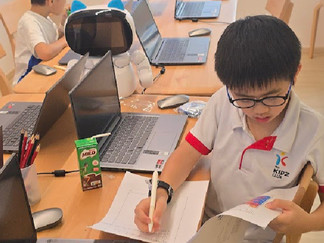How Coding Cultivates Leadership in Children: A Singapore Perspective
- Lee Zoey
- Oct 2, 2025
- 2 min read
In Singapore’s tech-driven society, coding is no longer just a technical skill – it is a powerful tool for nurturing leadership qualities in children. With numerous initiatives promoting digital literacy from an early age, children are gaining opportunities to enhance problem-solving, teamwork, and creative thinking abilities, all while enjoying themselves.
1. Problem-Solving and Decision-Making
Coding encourages children to break down complex problems into manageable steps, analyse multiple solutions, and systematically debug errors. These skills directly enhance decision-making and problem-solving abilities – essential traits for effective leadership. Many Singaporean schools have incorporated coding into the curriculum to strengthen logical thinking and analytical skills from a young age.
2. Collaboration and Teamwork

Competitions such as the Lyza Scratch Challenge 2025 (LSC) provide children with collaborative projects, allowing them to work in teams to develop interactive games or stories. Through these activities, participants learn to share ideas, resolve conflicts, and combine diverse approaches – a practical introduction to teamwork and leadership. Such experiences also reflect Singapore’s emphasis on collaborative learning in schools.
3. Creativity and Innovation
Coding nurtures creativity by enabling children to design apps, games, or interactive stories. For instance, the LSC 2025 theme, “Kebbi Explores Singapore,” challenges participants to creatively showcase Singaporean culture through their projects. This encourages innovative thinking and inspires children to experiment with fresh ideas, fostering the creativity leaders need to solve real-world problems.
4. Resilience and Growth Mindset

Debugging and troubleshooting code teach children persistence and resilience. Instead of fearing failure, they learn to iterate, adapt, and improve. Singapore’s education system emphasises a growth mindset, and coding provides a safe space for students to experience trial and error, reinforcing this important value.
5. Communication and Presentation

Leadership is not just about having ideas, it is about effectively communicating them. Presenting coding projects in classrooms or at competitions such as LSC 2025 helps children articulate their thought processes, explain solutions, and confidently engage with peers or judges. These experiences strengthen public speaking and persuasive communication skills, which are invaluable for young leaders.
6. Strategic Thinking
Coding requires foresight, planning, and prioritisation – skills directly transferable to leadership. Children learn to anticipate challenges, plan several steps ahead, and optimise their solutions, equipping them with strategic thinking abilities essential for decision-making in real-world scenarios.

Participating in coding activities, particularly through competitions like the Lyza Scratch Challenge 2025, equips children with the skills to become future leaders. By fostering problem-solving, collaboration, creativity, resilience, communication, and strategic thinking, coding lays a strong foundation for leadership in today’s digital era.

📌 Start Your Coding Journey Now!
At Lyza Education, your child will gain essential skills in a fun, supportive, and future-ready environment.










Comments